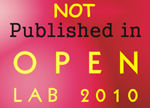All Washed Up
The popular press has been a major contributor to facile views of neuroimaging. So it seems ironic that everywhere you look, the new book Brainwashed: The Seductive Appeal of Mindless Neuroscience is in the news.
Has neuroscience left us 'Brainwashed'?
Dan Vergano, USA TODAY 9:39 a.m. EDT June 22, 2013
Have we all been brainwashed about brain images? Amid dazzling insights and daily advances into the workings of the mind, they also may engrain mistaken ideas about human nature, a book warns.
Will we see a reactionary resurgence of dualism as a result? In my previous post we learned that the brain is not the mind, according to David Brooks.1 Hopefully that was an isolated incident.
Nevertheless, allegations of neurobollocks, neurodoubt, and neuroscience fiction are fashionable these days. This has been useful in pointing out flawed studies, overblown conclusions, and overly hyped press releases. But some neuroskeptical scientists think the naysaying has gotten a little out of hand, and that expert critiques are easily misinterpreted. Dr. Gary Marcus summarized this well in The Problem with the Neuroscience Backlash, and I've written about it in the Journomarketing of Neurobollocks and Meet the Neuro Doubters.
Take the USA Today article above. It wasn't an egregious offender, yet it used an unfortunate mixed metaphor to make a point:
The brain is the temple of the mind, but are images of it in action a little over-worshipped?
The 'temple of the mind' terminology was from a Nature News story on the structure of the rat glutamate receptor GluA2. I found it bizarre that a reference to an article on protein crystallography, a method that produces an atomic-level picture of a single protein, was being used to prop up the 'seductive allure' of human brain images (a finding which hasn't replicated). In turn, someone decided that 'temple of the mind' was an appropriate way to describe the structure of the GluA2 receptor.2
Is Neuroscience All Washed Up?
One might get that opinion from a cursory reading of Brainwashed. But then Raymond Tallis Takes Out the 'Neurotrash':
...Tallis's beef is not just with crude methodologies. In detail so pitiless it threatens to be unreadable in parts, Aping Mankind argues that neuroscientific approaches to things like love, wisdom, and beauty are flawed because you can't reduce the mind to brain activity alone.
I believe that the brain is the ultimate arbiter of behavior (and that "the mind" is ultimately reducible to brain activity), but this doesn't preclude the view that interpersonal and social factors influence people's actions. Does anyone actually think that brains exist in isolation from any complex external influence (other than sensory stimulation)? It's a false dichotomy and a straw man argument foisted on neuroscientists by the neurotrashers. There are many different levels of analysis within the field, from molecules to synapses to systems to behavior.
Figure adapted from Churchland & Sejnowski (1988).
Graduate neuroscience programs are interdisciplinary in nature, and subfields like Cultural Neuroscience and Neuroanthropology are on the leading edge of incorporating culture into brain function (and vice versa). But very few fields cover that broad a scope.
image: Joan Y. Chiao in The Oxford Handbook of Social Neuroscience
Scientists and scholars in various disciplines generally do specialized research based on narrow areas of expertise. Are historians negligent because they're not incorporating knowledge of the brain into their analyses of past events? Of course not. So why are neuroscientists remiss if they fail to include detailed sociological and developmental accounts of crime in their Human Brain Mapping journal articles? 3
It's not surprising that each discipline privileges one level of explanation over another. The danger lies in discarding all other explanatory models in favor of your own. This also holds for theorizing within a field.
So is neuroscience all washed up? Well of course not. There's a great deal of optimism expressed in the megafunding for President Obama's new BRAIN Initiative, presented as a grand challenge for scientists. On the other hand, claims that "the average statistical power of studies in the neurosciences is very low" can be very discouraging (see Power failure: why small sample size undermines the reliability of neuroscience), if true. The proposed solutions might be more complicated (and underutilized) than the proponents of study pre-registration think.
Footnotes
1 Also see great posts on this by Björn Brembs and John Kubie.
2 And this stemmed from the authors' statement that the ion channel at the bottom of the GluA2 receptor is shaped "like a Mayan temple" (not that the 'temple of the mind' had been unlocked).
3 Admittedly, I used a controversial example here -- Increased executive functioning, attention, and cortical thickness in white-collar criminals -- to make a point. Is it completely wrongheaded to conduct group studies on neural differences in the brains of criminals, or does the real problem emerge if you try to predict an individual's future behavior based on brain structure? Here's an evisceration by our friend Dr. Tallis:
The crudity of Adrian Raine's opening arguments in The Anatomy of Violence – his manifesto for neurocriminology – is curiously refreshing. It is a long time since evolutionary psychology was served so neat.
Subscribe to Post Comments [Atom]















3 Comments:
In my opinion, there are two main kinds of people who like to argue that neuroscience is useless at best: 1. The closeted wannabe neuroscientist, usually somebody from the humanities or old-school psychologist; members of this category know they cannot catch up, but they do realize that their own discipline is put in serious danger by neuroscience. So, they need to declare it useless in a desperate attempt to remain relevant. William Uttal and his "New Phrenology" book is an example of this category. 2. The disgruntled neuroscientist who realized they picked the wrong career path. Members of this category reason that, if neuroscience was not a good path from them, then it cannot be for anyone and neuroscience must be declared useless to manage cognitive dissonance. Here, I won't provide names, out of kindness.
"...but this doesn't preclude the view that interpersonal and social factors influence people's actions."
This is the view of some of the "neuropharmacologists" and other new psychiatric animals, though.
I think many people who assert that "the brain is not the mind" are making a limited, and in my view defensible if imprecise claim. It is simply that we do not have any explanation for the experience of consciousness. We can agree that the brain -- or more precisely, processes occurring within the physical framework of the CNS -- generate behavior and experience, the latter are not synonymous with those processes. The sun is not the daylight.
Denying free will is deeply counterintuitive to most people. I think if we are to have a discussion with them we need first to concede the above paragraph.
Post a Comment
<< Home